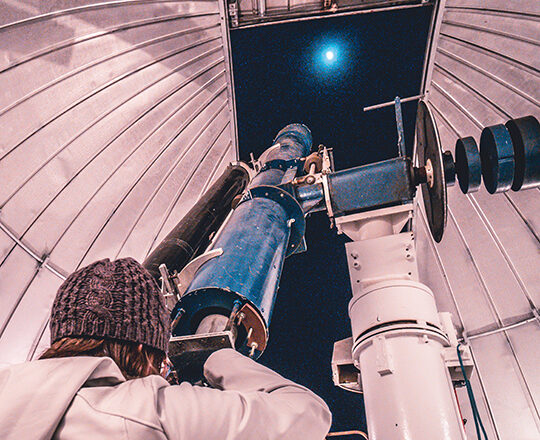Alfred University’s Stull Observatory is a valuable asset for the University’s new Bachelor of Science degree program in astrophysics. The University began offering the BS degree, along with a BS in physics, this academic year.
ALFRED, NY – Alfred University has received New York State approval of two new Bachelor of Science degree programs, in physics and astrophysics. The requirements for the existing BA degree in physics have also been revised, which will give students more flexibility in their academic pursuits.
The New York State Education Department informed the University in late August that it had approved the new BS degree programs. Joe Kirtland, associate professor of physics and chair of the Division of Physics and Astronomy in Alfred University’s College of Liberal Arts and Sciences, said the University could award its first BS degree in astrophysics in May 2024.
Historically, the University has awarded about five BA degrees in physics each year. With the addition of the two new degrees, Kirtland estimates the number of BA degrees in physics and BS degrees in physics and astrophysics could reach 20 per year.
According to Kirtland, the difference between the BA and BS degrees in physics lies primarily in the depth of physics coursework in the BS and the flexibility of the BA.
“Both degrees provide a solid background in physics as well as a broad education in the liberal arts through the same general education program completed by all students in the College of Liberal Arts and Sciences. The important difference is the BS degree has more of a focus on physics while the BA allows more room for other pursuits, including adding multiple minors or a second major or spending a semester abroad,” Kirtland explained.
While a BS degree recipient may be more likely to go on to graduate study in physics or astronomy specifically, recipients of either degree could move on to graduate study in other related fields or move directly into the workforce. The BA has prepared previous students for positions at planetariums and in science communication and outreach, but the coursework in computational physics and the independent research project required in the BS opens up even more opportunities, in areas like technology and engineering-based manufacturing, Kirtland noted. “This prepares students to do (computer) programming and to design and accomplish their own projects, which makes them very marketable and looks very good (to potential employers) on a resume.”
The new BS degree in astrophysics—Kirtland describes astrophysics as “the study of the fundamental physics of the very largest things in the universe; the way planets, stars, and galaxies work”—will leverage one of the University’s most unique assets: the Stull Observatory.
“For a school the size of Alfred to have a facility like (Stull) is quite uncommon. It’s a major draw for us,” Kirtland said. He noted that students are more likely to have an interest in astronomy than physics while in high school. “Students who visit and tour the observatory usually end up coming to Alfred.”
Kirtland said the Stull Observatory is ideal for students pursuing a degree in astrophysics because it is primarily an undergraduate teaching observatory, whereas similar facilities at larger schools lean more heavily toward graduate research. Once fully trained, undergraduates at Alfred University can help run the weekly open houses at the observatory and even perform their own observations whenever they like, weather permitting.
The University will continue to offer a minor in astronomy.
“Astronomy is concerned largely with the observation of the universe, taking data on stars and galaxies, looking for new objects,” Kirtland said. “Astrophysics is more of a study of how an object (in space) works. It involves a lot more knowledge of physics to understand how the universe works.”
The BS in astrophysics, like the BS in physics, requires completion of an independent project. Kirtland said Alfred University’s observatory is ideal for providing students the resources needed to complete research projects in astrophysics with a comprehensive background in physics.






